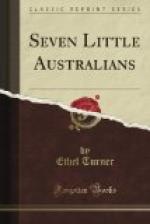Alan looked at her from his pew—the little figure in its sorrowful black, the shining hair hanging in a plait no longer frizzed at the end, the chastened droop of the young lips, the wistful sadness of the blue eyes. He could hardly realize it was the little scatterbrain girl who had written that letter, and stolen away through the darkness to meet his graceless young brother.
He clasped her hand when church was over; his grey eyes, with the quick moisture in them, made up for the clumsy stumbling words of sympathy he tried to speak.
“Let us be friends always, Miss Meg,” he said, as they parted at the Misrule gate.
“Yes, let us,” said Meg.
And the firm, frank friendship became a beautiful thing in both their lives, strengthening Meg and making the boy gentler.
Pip became his laughing, high-spirited self again, as even the most loving boy will, thanks to the merciful making of young hearts; but he used to get sudden fits of depression at times, and disappear all at once, in the midst of a game of cricket or football, or from the table when the noise was at its highest.
Bunty presented to the world just as grimy a face as of old, and hands even more grubby, for he had taken a mechanical turn of late, and spent his spare moments in manufacturing printing machines—so called—and fearful and wonderful engines, out of an old stove and some pots and rusty frying-pans rescued from the rubbish heap.
But he did not tell quite so many stories in these days; that deep sunset had stolen even into his young heart, and whenever he felt inclined to say “I never, ’twasn’t me, ’twasn’t my fault,” a tangle of dark curls rose before him, just as they had lain that night when he had not dared to move his eyes away from them.
Baby’s legs engrossed her very much at present, for she had just been promoted from socks to stockings, and all who remember the occasion in their own lives will realize the importance of it to her.
Nell seemed to grow prettier every day. Pip had his hands full with trying to keep her from growing conceited; if brotherly rubs and snubs availed anything, she ought to have been as lowly minded as if she had had red hair and a nose of heavenward bent.
Esther said she wished she could buy a few extra years, a stern brow, and dignity in large quantities from some place or other— there might be some chance, then, of Misrule resuming its baptismal and unexciting name of The River House.
But, oddly enough, no one echoed the wish.
The Captain never smoked at the end of the side veranda now: the ill-kept lawn made him see always a little figure in a pink frock and battered hat mowing the grass in a blaze of sunlight. Judy’s death made his six living children dearer to his heart, though he showed his affection very little more.
The General grew chubbier and more adorable every day he lived. It is no exaggeration to say that they all worshipped him now in his little kingly babyhood, for the dear life had been twice given, and the second time it was Judy’s gift, and priceless therefore.




